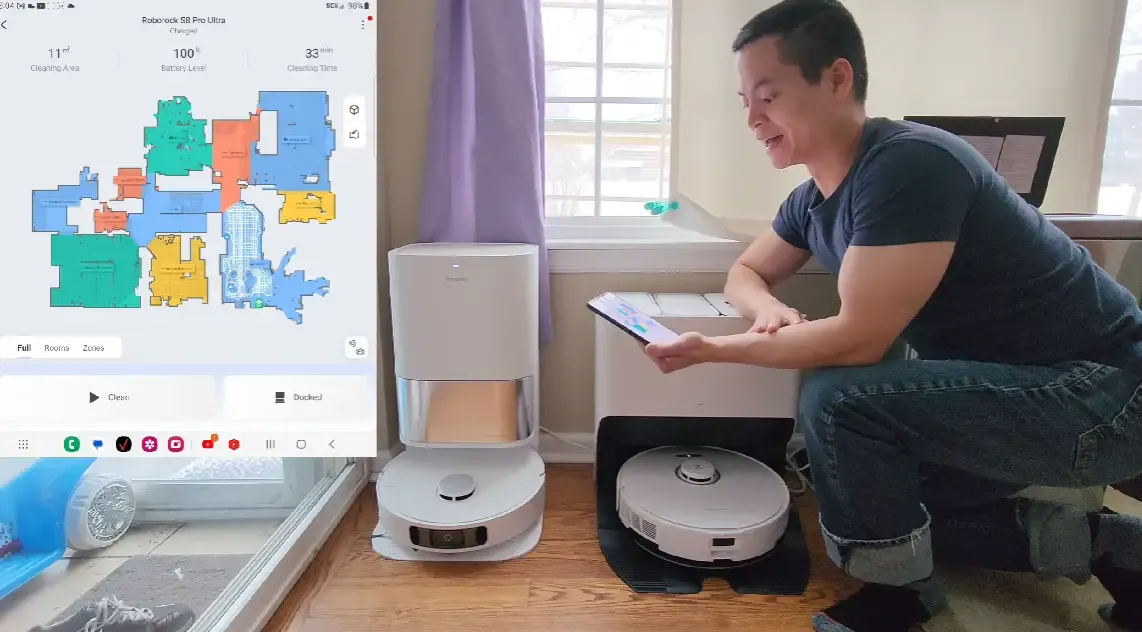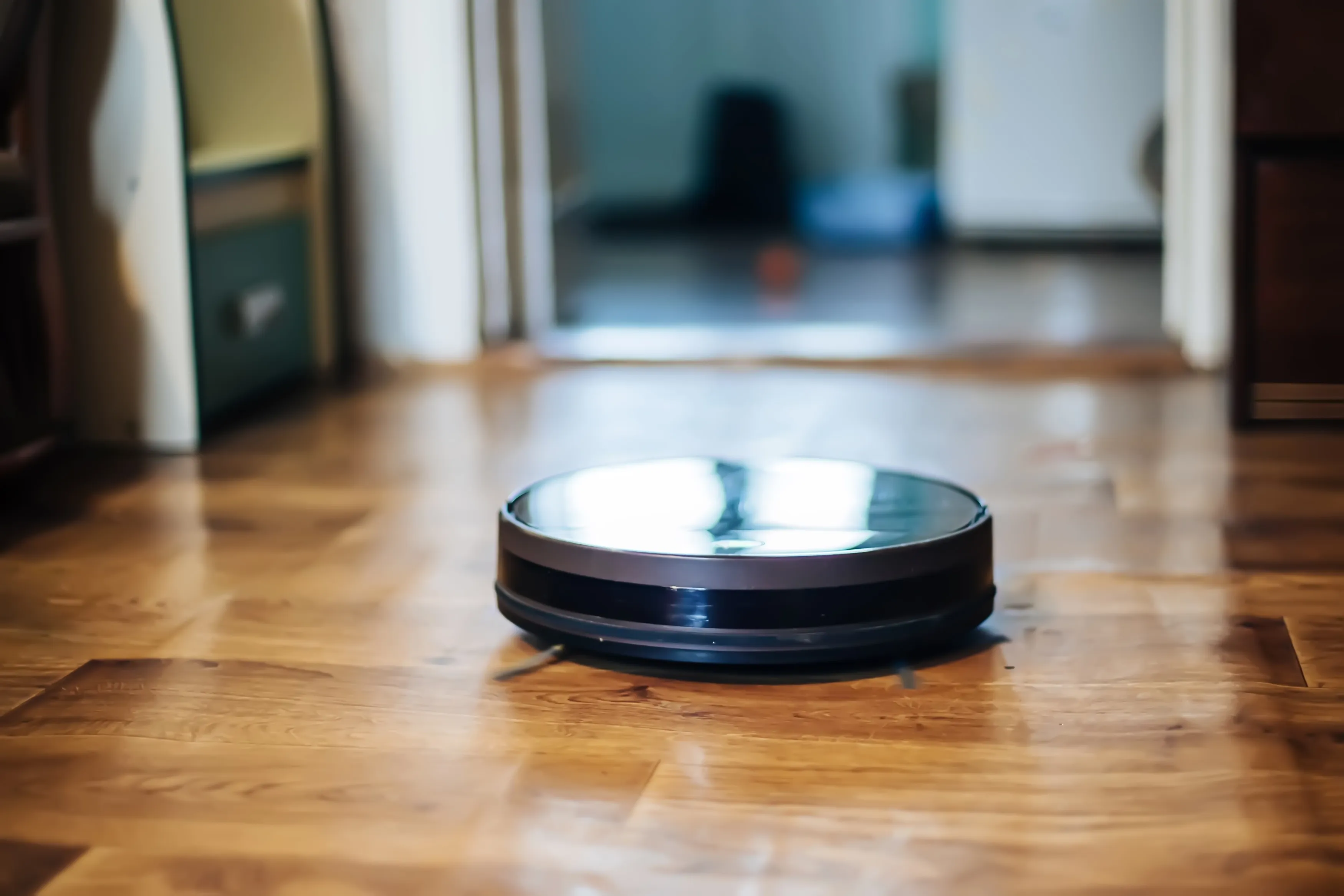How to Choose the Best Robot Vacuums?
When considering buying a robot vacuum, there are several factors to ensure that you choose the best one for your needs. Here are some of the most important factors.
Cleaning Performance
The primary reason for purchasing a robot vacuum is to clean your floors. Therefore, it is essential to consider the cleaning performance of the robot vacuum before making a purchase.
Look for a robot vacuum with strong suction power, efficient brushes, and effective filtration systems.
To determine cleaning performance, you need to rely on the specifications and information provided by the manufacturer such as suction power, sensors, mopping function, and suction function. Depending on each case and different usage needs, you can choose the right product for your home.
In case the need for use is not much, the floor area is small, no pets, and no children, you should consider using products with a mid-range price because the amount of dirt stored in your house is not much.
As for a house with a large area, especially with many pets, it requires your robot vacuum cleaner to work more than usual. In this case, you need to choose high-end products with high cleaning performance and diverse functions to handle the dust problems you are having in your home.
Navigation and Mapping

A good robot vacuum should be able to navigate around your home without getting stuck or causing any damage. Look for a robot vacuum with advanced mapping and navigation technology that can create a map of your home and avoid obstacles.
If you have children in your home, you certainly cannot avoid having toys scattered everywhere. This makes it difficult for your robot vacuum to clean up. In general, they will face problems such as getting stuck or not being able to move smoothly, leading to reduced cleaning performance, and many places where the robot vacuum cleaner cannot reach.
Or you own a house with a large area and many floors that make locating and mapping extremely difficult. When they are not equipped with the best technology, they can have difficulty in mapping resulting in your experience not being good.
One piece of advice for those in the above situation is to choose a Roborock Q5+ robot that is integrated with the latest and most advanced navigation and mapping technology, which will surely help you get the job done with ease.
Battery Life
The battery life of a robot vacuum is important because it determines how long the vacuum can clean before needing to recharge. Look for a robot vacuum with a battery life of at least 60 minutes or more.
For some of today's newest robots, this isn't a huge drawback.
Like the Eufy G30 Hybrid, when it realizes that the battery is about to run out, it will stop and move to the charging area. When fully charged again, it will continue to move to the previous stop position and continue the cleaning route set out (tested by us). It continues to draw the snake path (line to line) perfectly without any mess here.
However, based on the area of the floor that you need to clean, you should choose vacuum cleaners with longer battery life so that the cleaning process is not interrupted.
Noise
Most robot vacuums make some noise while cleaning, but some are quieter than others. If you have pets or children who are easily startled by loud noises, look for a robot vacuum with a low decibel rating.
A child's safe sound level at home is preferably below 60 dB. Most manufacturers pay attention to this problem, most of the machines on the market today reach from 56-58 dB. You can refer to the iRobot Roomba s9+ model we evaluated above if you have a baby and don't like too much noise. This product has a very useful quiet mode and I'm sure you will like it.
Price
Robot vacuums come in a variety of price points, so it's important to consider your budget before making a purchase. The most popular price ranges are mainly in the under $300, under $500, and under $1000 levels, and keep in mind that higher-priced models often come with more features and better performance.
According to our assessment, if your needs are not too great, a price under $300 can be completely suitable for you. Some models even include a mopping function, such as the Eufy L35 Hybrid is still the best option for you.
Why You Should Trust Us
To make sure that we have the most accurate results, we've gathered all the necessary tools and various house things for our tests. We've divided the testing area into equal sections for each robot vacuum so that they can be tested separately by using different types of surfaces, such as hardwood floors and carpets, to test the suction capabilities of each robot.
We measure the volume of dust and drop it onto the testing area for the robot vacuum to collect over a set period. We then calculate the cleaning efficiency by comparing the amount of dust collected before and after suction. To give an objective overview of each machine's capabilities, we vary the types of dust used in our tests, such as coffee, oats, sand, flour, and more.
We conduct similar tests for noise levels, object avoidance, and corner cleaning, and we measure and record the results in the same way to ensure consistency and transparency. We can provide accurate and objective results by adhering to a set period for each test.
To provide a reality experience, we also conduct tests in an actual home environment to see how the robot vacuum performs in a practical setting. This provides results that are closer to what you might experience in your own home.

Final Thoughts
The market for robot vacuums has grown rapidly in recent years, offering consumers a wide range of options to choose from. When selecting the best robot vacuum for your needs, it's important to consider factors such as the above.
Some of the top robot vacuums on the market include the iRobot Roomba s9+, which offers advanced features like self-emptying and room recognition, the Roborock S7, which is versatile and offers both vacuuming and mopping features.
The budget-friendly Eufy RoboVac 11S, which offers reliable cleaning performance at an affordable price. It's important to carefully consider your options and read reviews before purchasing to ensure that you select a robot vacuum that meets your expectations and provides you with a convenient and effective cleaning solution for your home.
FAQs
1. What is the best robot vacuum to buy?
Some of the top robot vacuum picks include iRobot Roomba, Shark IQ Robot, Eufy RoboVac, and Neato Botvac. Roombas are famous for their strong suction and smart navigation, while Eufy and Shark offer solid performance at more budget-friendly prices. Your best choice depends on whether you value premium features or great value for money.
2. How well do robot vacuums clean compared to regular vacuums?
Some folks doubt that a small robot vacuum can match the power of a big upright or canister, but tech has really improved! Today’s top robot vacuums have strong suction, smart mapping, and specialized brushes to keep floors tidy day-to-day.
3. What are the disadvantages of robot vacuum?
Robot vacuums can't fully replace manual cleaning. They may miss some areas like corners and edges. But for daily touch-up cleaning, robot vacuums do an excellent job keeping floors tidy in between deeper cleanings. Overall, they provide huge time savings and cleaner floors for most home needs.
4. Are robot vacuums worth the cost?
For most households, a good robot vacuum that fits your budget is worth the investment. They deliver convenient everyday cleaning by working independently around your home. You get cleaner floors with little daily effort.
5. How often should you change the filter on a robot vacuum?
You should change the filter on a robot vacuum every 2-4 months depending on how often you use it and the type of flooring and debris. Some manufacturers recommend changing filters as often as every month if you have pets, while others say every 3-6 months is sufficient.
6. Do robot vacuums work well with carpets?
Yes. Robot vacuums can work fairly well on carpets if they have a suction power of 1500 Pa or higher and proper bristle strips and roller brushes for agitating the carpet fibers. Some high-end robotic vacuums have specialized "Max" modes that kick up the suction power specifically for carpets.
7. How long do robot vacuums last?
On average, robot vacuums tend to last between 5 and 8 years before requiring replacement or major repairs. However, some factors can affect their lifespan including how often they're used, the type of flooring, whether filters are changed regularly, and how well they're maintained. Newer models from reputable brands often come with 2-3 year warranties which covers any defects in parts or workmanship, but not normal wear and tear over time.





















